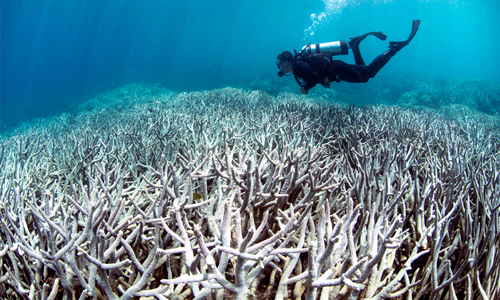

By Tierney Smith
The Great Barrier Reef is under siege from climate change and coal, with scientists confirming that 93 percent of the world heritage area is now suffering from severe coral bleaching.
Photo credit: XL Catlin Seaview Survey
The unprecedented event, caused by climate change warming the ocean, is being called “an environmental assault on the largest coral ecosystem on Earth.” Only around 50 percent of the impacted corals are expected to survive, and in some areas, only a mere 10 percent may recover.
So heavy is the toll, 56 scientists have once again called on the Australian government to phase out coal, and are taking ever greater message to their warnings are heard. The expansion of Australian coal is already having dire impacts on the Reef, and will continue to drive the climate impacts that are killing Australia’s famous heritage site.
I showed the results of aerial surveys of #bleaching on the #GreatBarrierReef to my students, And then we wept. pic.twitter.com/bry5cMmzdn
— Terry Hughes (@ProfTerryHughes) April 19, 2016
Yet despite the government’s willingness to pick up the phone about the parlous state of the reef, they seem unwilling to acknowledge that it’s way past time Australia ditched coal.
Key Points:
- Climate change is killing the Great Barrier Reef before our eyes. Aerial checks of more than 900 reefs along the 2,300 kilometer site are showing 90 percent of coral north of Port Douglas now white, and 10 percent of the reef south of Mackay. Not only has Australia already lost upwards of 50 percent of coral cover in the past 30 years, but scientists warn this is the third mass coral bleaching event in just over half that time.
- This vital ecosystem can be saved, but it will take extraordinary effort. The Great Barrier Reef is one of the world’s most diverse ocean habitats, it generates more than $5 billion in tourism revenues and employs nearly 70,000 people. Despite this, the Australian government has recently approved a massive new coal mine in Queensland that will threaten the reef and see the country’s emissions skyrocket. Only an end to coal expansion and exports will allow Australia to adequately protect the Reef.
- Governments must favor coral over fossil fuels. The world is in the midst of a global coral bleaching event on scale with the worst ever bleaching on record and scientists warn dire predictions made on coral decline could now be realized. As leaders look to re-affirm their commitment to tackling climate change, they can show they are serious about protecting this vital marine ecosystem by urgently moving towards a fossil free and 100 percent renewable future.
YOU MIGHT ALSO LIKE
Largest Coral Atoll in the World Lost 80 Percent of Its Coral to Bleaching
Sardine Fishing Banned in Pacific Northwest as Stocks Hit Historic Low
Bill Nye vs. Sarah Palin on Climate Change: Who Do You Believe?
Scientists Start to Look at Ground Beneath Their Feet for Solution to Climate Change

 233k
233k  41k
41k  Subscribe
Subscribe 
